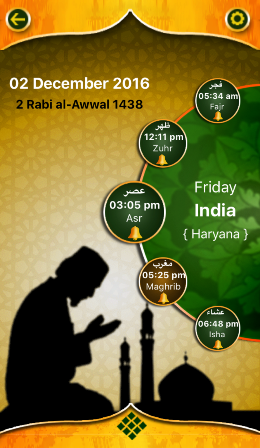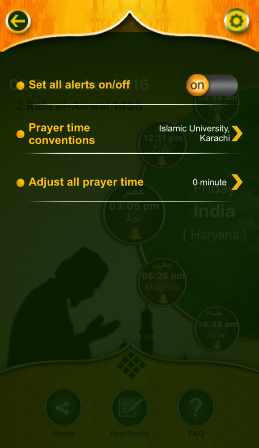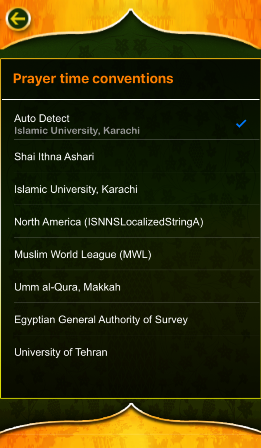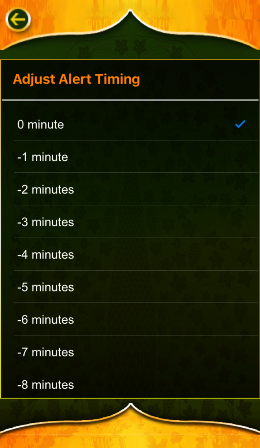


Get alerts for namaz/ Salat timings so that you do not miss or get late to offer prayers. The alerts help you remain connected with Allah and follow the five pillars of Islam (Shahadah, Salat, Zakat, Sawm, and Hajj) without fail.
Here you get the most accurate prayer timings anywhere in world.

Users get to toggle the Namaz/Salah/prayer alerts ON/OFF. The alerts help you not to miss any prayer and gives a notification on the screen along with an azan. Using the alert service along with the other features, you can now follow Islam and the five pillars of Islam preached by Prophet Mohammad to become a follower of Allah and a purified Muslim.
This muslimsapp focuses more on Sunni sect of religion and is made as per the Sharia law, with five times Namaz a day prayer alerts. The azan played as an alarm is in the voice of greatest maulwi’s of time.
Special alert tunes for the month of Ramadan are available.

Users can select the prayer/Namaz time convention as per their school of following from Shai Ithna Ashari, Islamic University Karachi, North America, Muslim World League, Umm Al-Qura, Makkah (Mecca), Egyptian General Assembly of Survey, university of Tehran or can set the convention to automatic where in the alerts are given based on the location.

The prayer (Ibadat/Namaz/Salat) time alerts can be set with an error adjustment mechanism. The alerts will be notified with an mp3 version Ayat being recited for 30 seconds extracted from Koran in Arabic.
We will shortly be coming out with an improved version with extra features for Jummah namaz of Friday as well.
Salah (صلاة or ṣalāt or صلوات ṣalawāt), called in some languages by the Persian-derived term namāz (Persian: نَماز) is one of the Five Pillars in the faith of Islam and an obligatory religious duty for every Muslim. It is a physical, mental, and spiritual act of worship that is observed five times every day at prescribed times. In this ritual, the worshiper starts standing, bows, prostrates, and concludes while sitting on the ground. During each posture, the worshiper recites or reads certain verses, phrases and prayers. The word salah is commonly translated to prayer but this definition might be confusing. Muslims use the words "Dua" or "Supplication" when referring to the common definition of prayers which is "reverent petitions made to God."
Salat is preceded by ritual ablution. Salat consists of the repetition of a unit called a rakʿah, consisting of prescribed actions and words. The number of obligatory (fard) rakaʿāt varies from two to four according to the time of day or other circumstances (such as Friday congregational worship, which has two rakats). Prayer is obligatory for all Muslims except those who are prepubescent, are menstruating, or are experiencing bleeding in the 40 days after childbirth. Every movement in the salat is accompanied by the takbir except the standing between the ruku and sujud, and the ending which has a derivation of the Muslim greeting As-salamu alaykum.
Salat (ṣalāt) is an Arabic word whose basic meaning is "bowing, homage, worship, prayer." In its English usage, the reference of the word is almost always confined to the Muslim formal, obligatory worship described in this article.
Translating salat as "prayer" is not usually considered precise enough, as "prayer" can indicate several different ways of relating to God; personal prayer or supplication is called duʿāʾ in Islamic usage.
Muslims themselves use several terms to refer to salah depending on their language or culture. In many parts of the world, including many non-Arab countries such as Indonesia, the Arabic term salat or salah is used. The other major term is the Persian word namāz(نماز), used by speakers of the Indo-Iranian languages (e.g., Kurdish, Urdu, Balochi, Hindi), as well as Turkish, Russian, Chinese, Bosnian and Albanian. In North Caucasian languages, the term is lamaz (ламаз) in Chechen, chak (чак) in Lak and kak in Avar.
Muslims are commanded to perform prayers five times a day. These prayers are obligatory on every Muslim who has reached the age of puberty, with the exception being those who are mentally ill, too physically ill for it to be possible, menstruating, or experiencing postnatal bleeding. Those who are ill or otherwise physically unable to offer their prayers in the traditional form are permitted to offer their prayers while sitting or lying, as they are able. The five prayers are each assigned to certain prescribed times (al waqt) at which they must be performed, unless there is a compelling reason for not being able to perform them on time. These times are measured according to the movement of the sun. These are: near dawn (fajr), after midday has passed and the sun starts to tilt downwards / Noon (zuhr), in the afternoon (asr), just after sunset (maghrib) and around nightfall (Isha). Under some circumstances ritual worship can be shortened or combined (according to prescribed procedures). In case a ritual worship is not performed at the right time, it must be performed later.
Some Muslims offer voluntary prayers (sunna rawatib) immediately before and after the prescribed fard prayers. Sunni Muslims classify these prayers as sunnah, while Shi'ah consider them nafil. The number of rakats for each of the five obligatory prayers as well as the voluntary prayers (before and after) are listed below: